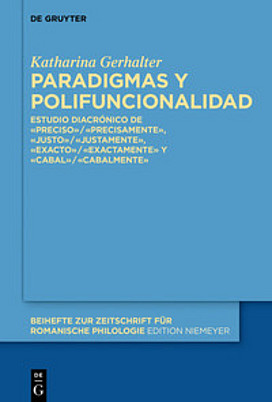PhD thesis
submitted PhD thesis:
Katharina Gerhalter (2018): "Paradigmas y polifuncionalidad. La diacronía de preciso / precisamente, justo / justamente, exacto / exactamente y cabal / cabalmente". Dissertation, Karl-Franzens University of Graz.
Revised and peer-reviewed publication:
Gerhalter, Katharina (2020): Paradigmas y polifuncionalidad. Estudio diacrónico de 'preciso' / 'precisamente', 'justo' / 'justamente', 'exacto' / 'exactamente' y 'cabal' / 'cabalmente'. Berlin/Bostin: de Gruyter(Beihefte zur Zeitschrift für Romanische Philologie 448), 521 pp. Open Access: https://doi.org/10.1515/9783110669831
Abstract in English: pdf
Reviews: Adrian Chircu (2021) in Studia Universitatis Babeș-Bolyai. Philologia 66(4), 371-375, http://studia.ubbcluj.ro/serii/philologia/open_access.html [in French]; José García Pérez (2022) in Anuario de Estudios Filológicos 45, 411-417, https://publicaciones.unex.es/index.php/AEF/article/view/718,[in Spanish].
Synopsis:
This corpus-based study analyzes the paradigm of Spanish adjectives and adverbs of the exactness-domain from semasiological and onomasiological perspectives. The first part analyzes the diachronic development of each lexeme pair (justo / justamente, cabal / cabalmente, preciso / precisamente and exacto / exactamente), in particular the semantic changes from their Latin origin to the actual Spanish meaning ('exact'/'exactly').
The second part analyzes the three pragmatic or discourse functions of these adjectives and averbs, namely (1) focus, (2) affirmation, and (3) reformulation.
- Tuvo que pasar justo hoy ('this is happening today of all days')
eso no fue precisamente democrático ('this was not exactly democratic') - ¡Exacto! ('Yes, exactly!')
- ..., más exactamente, ... ('..., more exactly, ...')
The analyzed data show that each of these three microparadigms has a central lexeme that drives the semantic and syntactic developments that lead to the emergence of new discourse functions. The remaining adjectives and adverbs adopt the new usages by analogy, for which the term "paradigmatic effect" (efecto paradigmático) is proposed. Not all adjectives and adverbs of the exactness-paradigm take over all pragmatic functions, since the sometimes "disturbing" polysemy of the individual lexemes, as well as their different diachronic lines of development, block certain further developments.
The results are analyzed within the theoretical framework of grammaticalization (more precisely: pragmaticization or subjectivization) as well as cooptation (Thetical Grammar), which in themselves are not sufficient to explain factors such as mutual semantic-functional influences within a paradigm.
Supervisor and first reviewer: Univ.-Prof. Dr. Martin Hummel
Second reviewer: Ao.Univ.-Prof. Dr. Stefan Schneider
